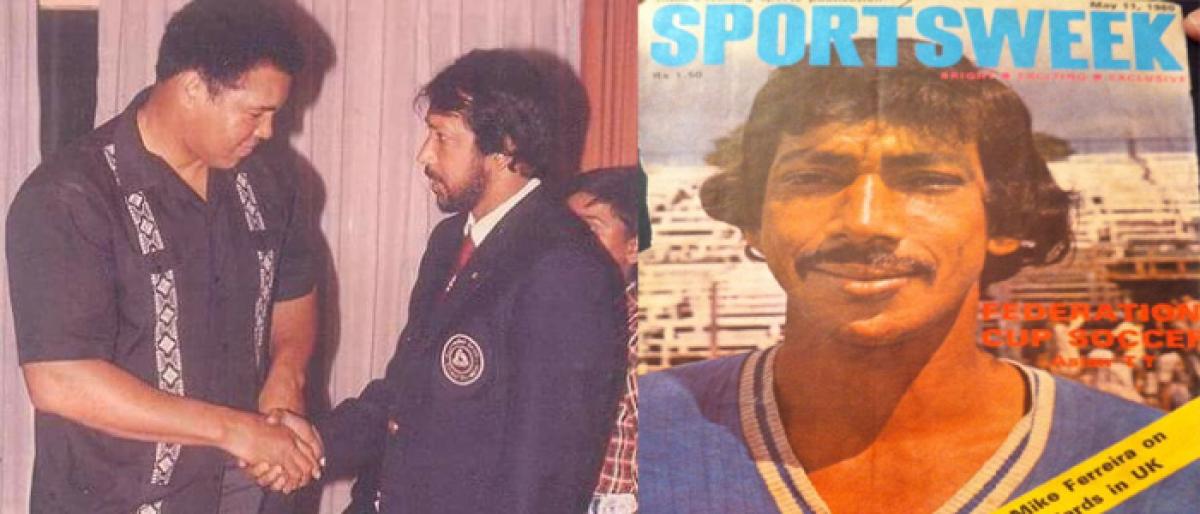Live
- Rohit Sharma is a leader, doesn't matter if you name him captain or not: Brian Lara
- How daytime sleep can raise dementia risk
- 2024 Lok Sabha elections: Some interesting facts about Friday's first phase
- Today is World Heritage Day : Raising awareness about importance of natural heritage sites
- Hindustan Zinc says it has become world's 3rd largest silver producer
- 'BJP is truly secular': Goa CM welcomes Archbishop's circular
- The journey of pursuing B.Sc in fashion & apparel design
- HDFC Life logs Rs 1,569 crore PAT, declares final dividend of Rs 2
- IPL 2024: Jay Shah invited 12,000 Cancer and Thalassemia to watch GTvDC match live in Ahmedabad
- Two criminals held for killing a man in Delhi
Just In

On any bright summer morning, stroll near Darulshifa, Hyderabad, and you will see boys of all age groups donning coloured jerseys of various international clubs and teams practicing football at Abbas Union FC ground (behind Salar Jung Museum).
On any bright summer morning, stroll near Darulshifa, Hyderabad, and you will see boys of all age groups donning coloured jerseys of various international clubs and teams practicing football at Abbas Union FC ground (behind Salar Jung Museum).
Go closely and you see a veteran imparting the nuances of the game to the future bearers of the sport. Rated as the best player in the 70s and 80s and one of the best strikers of his time, Shabbir Ali is now dedicating his time to coach the youngsters. “I had started my football journey from this very ground (Abbas Union FC) and now I come here now and then and coach these kids,” says the legendary striker.
“When I started the game, my family, especially my mother and brother were against it, because they believed in the adage ‘Padhoge likhoge toh banoge nawab. Kheloge khudoge toh hoge kharab’ (If you study you will become a prince. If you play, then you will ruin yourself).
However, after seeing my passion and game, eventually they supported me. Whatever I am today is because of this sport. I am not saying that studies are not important, but sports are also equally important.” Shabbir Ali started his career at Tata Sports Club, Mumbai, in the 70s and he mesmerised the fans of the game with his performances.
“I got an offer from Tata and also from Mohammedan Sporting in 1972. At that time many footballers used to go to Calcutta and very few to Bombay. I took advice from Mr Salam, Olympian, and he suggested that it is better to go to Bombay. My relatives were in Bombay and that was an advantage and also the reason to relocate to there.”
After a good stint at Tata, Shabbir moved to East Bengal and he later joined Mohammedan Sporting in 1978 and took the club to great heights. “I had a career that was going good, had a flat, etc, and people thought that I would never leave Bombay.
I once visited Calcutta just to see how it is because I had heard a lot about it and fell in love with the city and its sporting culture. I will not forget in my life what I got in Calcutta.”
“That year East Bengal was out of the league. But still people came to just see my game and it was a wonderful feeling. People speculated that I could not play in Calcutta because of muddy pitches, however, in Bombay when it rains the pitches are worse than Calcutta (smiles).”
Shabbir was selected in India U-19 team in 1974. He was captain in the Asian Youth U-19 Cup and India emerged joint victors with Iran, Shabbir striking five goals, a performance which was hailed by the then prime minister Indira Gandhi.
“Nobody thought we would reach the final let alone participate in the event. We won against all odds in that tourney,” recalls the 62-year-old veteran.
In the same year, he got a call-up to the National team and he went on to become one of the most prolific scorers in the history of Indian football.
Shabbir hanged his boots in 1985 and donned the hat of a coach. He earned a first-class diploma from the Sports Authority of India and passed the German football association B License coach and also their four-week coaching course, which is equivalent to A License.
“I was recommended for Arjuna Award, but I did not receive it. I don’t know why. Even people who played under my captaincy were bestowed with it. But I have no complaints. I thank god for the Dhyan Chand Award that I received in 2011 that recognises the services of a coach.”
He has also coached the Telangana team, but on a short notice. “I would like to thank Telangana Association for giving me an opportunity to coach the State team. The results were not that good but then were not that bad also. Time was short, and we had some close matches,” he adds.
About Indian team qualifying in the coveted world cup he says, “It is a long way to go. We have to start from the grassroots and concentrate on the senior team and play more matches.”
“Its high time that government should help sportspersons. Earlier there were jobs for sportspersons, now they are hardly there. It will be good for players if they have at least two per cent reservation in jobs. It will help them to concentrate on the game more.”
Shabbir calls Indian Super League (ISL), a good initiative for football in India, as it brought Indian football on the world map, “It is good for players and good for spectators as well. With ISL, players established themselves.”

© 2024 Hyderabad Media House Limited/The Hans India. All rights reserved. Powered by hocalwire.com







